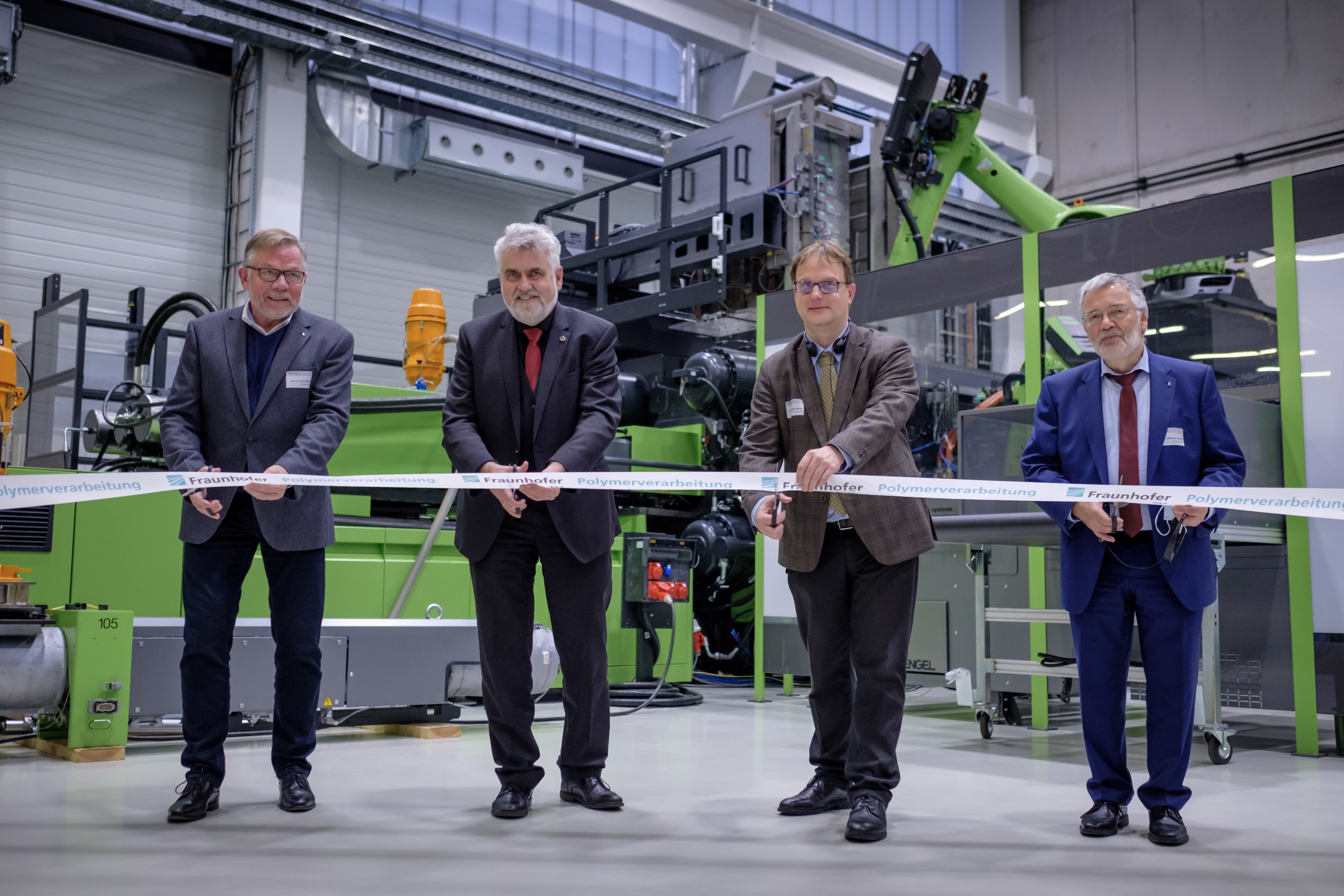Lightweight construction, sustainable tires, Industry 4.0: 11 million euros for future technologies at Fraunhofer PAZ Schkopau
With 1000 m² of additional space and new facilities for thermoplastic-based lightweight construction, sustainable tire applications, and digital component development and production processes in plastics processing, the polymer processing area at the Fraunhofer Pilot Plant Center for Polymer Synthesis and Processing PAZ in Schkopau has been expanded. Funds from the European Union, the state of Saxony-Anhalt and the Fraunhofer-Gesellschaft were used to invest a total of a good 11 million euros in the extension building, which opened today.


As a joint facility, the Fraunhofer PAZ Schkopau combines competencies in polymer synthesis from the Fraunhofer Institute for Applied Polymer Research IAP (Potsdam) and polymer processing from the Fraunhofer Institute for Microstructure of Materials and Systems IMWS (Halle/Saale). The focus of the research facility is on scale transfer, i.e. transferring new results and ideas from research to scales that are relevant to industry. Companies such as polymer manufacturers, plant engineers or from the automotive industry are thus supported in the commercialization of new products and manufacturing processes.
"The economy in Saxony-Anhalt is undergoing profound changes in view of advancing digitization and the shift toward electromobility and sustainable business. To enable companies in our state to take advantage of the opportunities this brings, we are investing in business-related research institutions such as the Fraunhofer PAZ. Companies can develop innovative products in cooperation with these excellent institutions and thus secure their competitiveness in turbulent times," explains Saxony-Anhalt's Science Minister Prof. Armin Willingmann. "Especially for the automotive and chemical industries, Fraunhofer PAZ has developed into an important cooperation partner and established itself as a successful interface between excellent research and industrial application."
The expanded premises and newly installed equipment in the polymer processing area in particular offer significantly improved possibilities for the production of thermoplastic fiber composite components in large series. This technology is particularly important for lightweight automotive construction - the lighter a vehicle is, the less fuel it consumes or the greater its range in e-mobility. The research work is aimed at producing high performance plastic components in cycle times of less than one minute. To this end, high-speed handling equipment and machines are now available in all production steps (preforming, hot handling and injection molding). Likewise, the integration of sensors is now possible at various stages of the manufacturing process. "This is a crucial prerequisite for digital component development and digital production processes in the context of Industry 4.0. We gain data at various levels, the linking of which enables new, application-specific configurations of components, new tools for defect detection and sustainable production in plastics processing," says Prof. Peter Michel, who as head of the Polymer Applications Business Unit at the Fraunhofer IMWS is responsible for the polymer processing area at the Fraunhofer PAZ. "The expansion enables us to provide our customers with an even more attractive portfolio of competencies and equipment and to offer an outstanding research infrastructure for the regional chemical industry," says Michel.
A second focus of the expanded profile is on innovative rubber technologies that offer optimization in adhesion (rolling resistance), wear and abrasion (reduced microplastic impact on the environment) of tires, as well as improved opportunities for closed-loop use (retreading, recycling). Pilot-scale compounding technologies for innovative rubber compounds (internal mixer, vulcanizer, extruder, rolling mill) are available in the new pilot plant, again including consideration of digital capabilities. Fraunhofer PAZ is the only research facility in the world with a tandem kneader, which makes it possible to produce improved rubber compounds with novel morphologies on a pilot scale. In addition, the 28 employees in the polymer processing department are now ideally equipped for testing and applying novel elastomers, fillers and additives, and will in future be even more involved in the further development of synthetic rubber, including from bio-based sources.
"Sustainability and digitalization are megatrends that require considerable research. Currently, we are also seeing very strong interest among our customers from the plastics industry in solutions from the bioeconomy and circular economy. I am very pleased that the expanded facilities in Schkopau will enable us to make important contributions to innovative lightweight materials and also to further expand our work on sustainable tire materials. These approaches complement the future topics of our institute very well," says Prof. Matthias Petzold, acting director of the Fraunhofer IMWS.
Prof. Michael Bartke, head of the Fraunhofer PAZ and the polymer synthesis division, emphasizes: "With the expansion of the pilot plant center in the area of polymer processing, we are significantly increasing the portfolio of experimental possibilities. We are also currently expanding the polymer synthesis area considerably with a new building and new facilities. Commissioning is planned here for 2022. Then our customers in the chemical and plastics processing industries will be able to benefit to the highest degree from our extensive range of services - from monomers to tested components."